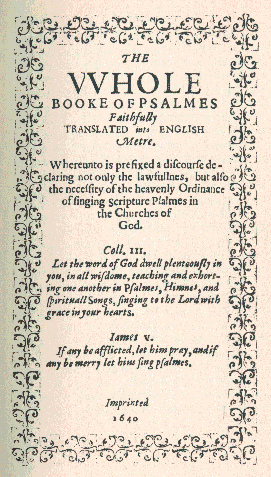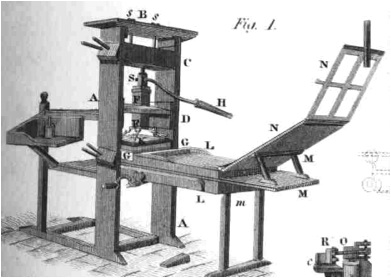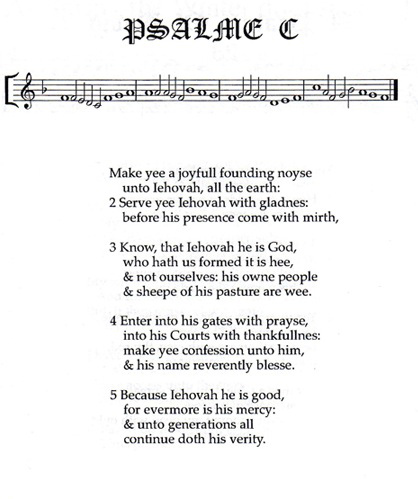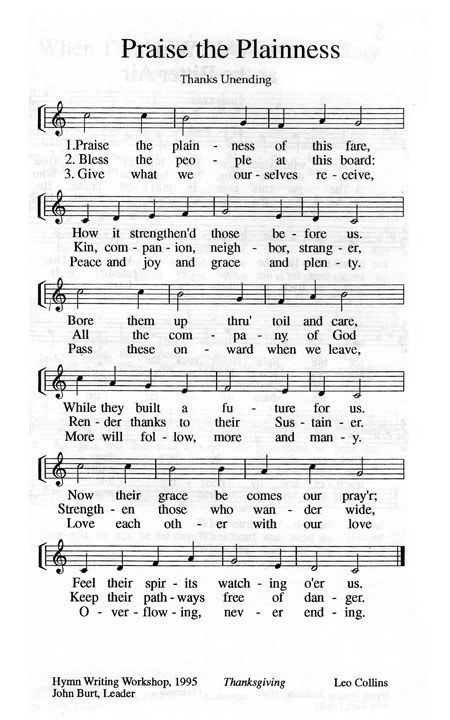 Singing Psalms
Singing PsalmsThe Congregation's Service Responsibility
‘If any be afflicted, let him pray, and if any be merry let him sing psalmes.’ James V: 15
The first book to be published in the New World was ‘The Whole Booke of Psalmes Faithfully translated into English Metre,’ 1640. In his ‘prefixed...discourse’, John Cotton, with numerous scriptural quotes, makes it clear that there is ‘not only the lawfullness, but also the necessity of the heavenly Ordinance of singing Scripture Psalmes in the Churches of God.'
At the outset, Cotton poses three questions:
Q Which psalms to sing, David’s or those composed by godly men? In prose or poetry? By whom will they be sung?
A Davids; in poetry; by all.
David’s psalms ‘are of morall, univerrsall, and perpetuall authority in all nations and ages. The ancient Hebrews had musical instruments with their psalms and incense with their prayers. But psalmes and prayers are moral duties; we can do without the instruments and incense.'
Q ‘Ministers are allowed to pray conceived prayers, and why not to sing conceived psalms?’
A ‘...every good minister hath not a gift of spirituall poetry to compose extemporary psalmes as he hath of prayer...[and] psalmes are to be sung by a joynt consent and harmony of all the Church in heart and voyce...’ Also, ‘the booke of psalmes is so compleat a System of psalmes, which the Holy Ghost himself in infinite wisdome hath made to suit all the conditions, necessityes, temptations, affections of men in all ages...the Lord himselfe hath suplyed us.’
Therefore, ‘those set formes of psalmes of Gods owne appoyntment, not of mans conceived gift or humane imposition [are to be] sung in the spirit...the whole Church is to joyne together in heart and voyce to prayse the Lord...the women also as well as the men...they [are] with their mouths to sing it together as well as with their hearts.’
As to the practice of the Deacon ‘lining out’ the psalm, Cotton says: ‘When one of us hath begun a psalme, the rest of us set in to sing with him, all of us with one heart and one voyce.’
Q ‘...are not all the creatures in heaven, earth, seas: men, beasts, fishes, foules commanded to praise the Lord?
A ‘Yet none of these but men can doe it with spirituall understanding.’
Q Why psalms in meter?
A Because ‘many verses...in psalmes of David run in rithmes which shews the lawfullnes.’ They are ‘not in the common style [prose] of such other bookes of the old Testament.’
Q Why not in the original Hebrew?
 A ‘No protestant doubteth but that all the bookes of the scripture should by Gods ordinance be extant in the mother tongue of each nation, that they may be understood [by] all, hence the psalmes are to be translated into our english tongue.’ [Also] ‘if in our english tongue wee are to sing them, then as all our english songs do run in metre, soe ought Davids psalmes to be translated into meeter.’ [Also] ‘...as the Lord hath hid from us the hebrew tunes...[let] every nation...follow the graver sort of tunes of their owne country songs.’
A ‘No protestant doubteth but that all the bookes of the scripture should by Gods ordinance be extant in the mother tongue of each nation, that they may be understood [by] all, hence the psalmes are to be translated into our english tongue.’ [Also] ‘if in our english tongue wee are to sing them, then as all our english songs do run in metre, soe ought Davids psalmes to be translated into meeter.’ [Also] ‘...as the Lord hath hid from us the hebrew tunes...[let] every nation...follow the graver sort of tunes of their owne country songs.’As to the translation, ‘...wee have taken [no] liberty or poeticall licence to depart from the true and proper sense of Davids words, noe;...our religious care and faithfull indeavour [is] to keepe close to the originall text.’ ‘...others have presented a paraphrase of the words of David...our indeavour [is] to make a plaine and familiar translation of the psalmes and words of David, [and]...wee have used the Idioms of our owne tongue in stead of Hebraismes.’
‘If the verses are not alwayes so smooth and elegant as some may desire or expect, let them consider that Gods Altar needs not our polishings.’
We have done this ‘soe that wee may sing in Sion the Lords songs of prayse according to his owne will.’
1,700 copies of the Whole Book of Psalmes were printed and sold at 20 pence a copy.

